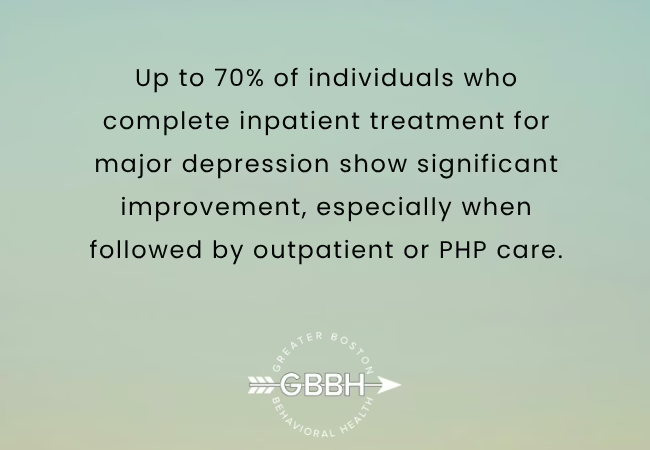When mental health symptoms reach a point where daily life becomes unmanageable—or when outpatient support isn’t enough—inpatient treatment offers a vital, structured, and safe path forward. At Greater Boston Behavioral Health, our Inpatient Treatment Program in Massachusetts is designed for individuals who need intensive support to stabilize and heal, whether they’re facing depression, trauma, anxiety, or a co-occurring disorder.
In this guide, we’ll walk you through what to expect when you enter an inpatient program—from the first intake appointment to daily schedules, therapeutic approaches, and the transition back into everyday life.
What Is an Inpatient Treatment Program?
An inpatient treatment program, sometimes referred to as residential mental health treatment, involves living at a mental health facility full-time while receiving 24/7 care and support. It’s ideal for individuals who:
- Are in crisis or at risk of harm to self or others
- Struggle with severe depression or trauma
- Need stabilization before transitioning to outpatient care
- Require removal from an unsafe or triggering environment
Unlike outpatient or partial programs, inpatient care offers full immersion in recovery—with structured therapy, clinical oversight, and personalized support in one place.
Intake and Assessment: Your Journey Begins
Your recovery journey starts with a comprehensive intake assessment. During this process, our clinical team evaluates your:
- Mental health history
- Medical background
- Substance use (if any)
- Current symptoms and triggers
- Treatment goals and preferences
This assessment allows us to create a personalized treatment plan that evolves with your progress.
Daily Schedule in an Inpatient Program
A predictable, structured daily routine is key to recovery. At our Mental Health Treatment Center in Massachusetts, a typical day may include:
| Time | Activity |
|---|---|
| 7:00 AM | Wake-up and morning wellness check |
| 8:00 AM | Breakfast |
| 9:00 AM | Individual therapy (CBT, DBT, or trauma-focused) |
| 10:30 AM | Group therapy (e.g., coping skills, peer support) |
| 12:00 PM | Lunch |
| 1:00 PM | Medication check or psychiatric evaluation |
| 2:00 PM | Holistic therapy (art, yoga, mindfulness) |
| 4:00 PM | Family or anger management therapy sessions |
| 6:00 PM | Dinner |
| 7:00 PM | Evening support group or journaling |
| 9:00 PM | Wind-down routine and lights out |
This blend of clinical and holistic support helps patients rebuild stability and learn new emotional regulation techniques.
Therapies Offered in Inpatient Treatment
At Greater Boston Behavioral Health, we offer a wide range of therapeutic modalities to support mental health recovery:
Cognitive Behavioral Therapy (CBT)
Helps identify and change negative thought patterns related to depression and anxiety.
Dialectical Behavior Therapy (DBT)
Ideal for emotional regulation, distress tolerance, and individuals with trauma or borderline personality traits.
Trauma Therapy Program in Massachusetts
Includes EMDR, trauma-focused CBT, and somatic therapy for individuals coping with past abuse or PTSD.
Group Therapy
Promotes connection, peer learning, and interpersonal growth.
Holistic and Experiential Therapies
Such as meditation, art therapy, and body movement for mind-body healing.
Support Beyond the Individual
Family involvement is crucial. That’s why we offer family counseling, education, and support to help loved ones:
- Understand your condition
- Learn how to offer support
- Heal relationship strain
- Create a stable home environment for aftercare
This approach ensures the healing process extends beyond the individual.
What’s the Difference Between Inpatient and Residential Treatment?
Though often used interchangeably, inpatient and residential treatment programs differ slightly:
-
Inpatient treatment usually refers to short-term, medically supervised care in a hospital-like setting, often following a crisis or acute episode.
-
Residential treatment is longer-term, providing intensive therapy in a more home-like setting focused on ongoing recovery.
At Greater Boston Behavioral Health, we blend the structure of inpatient treatment with the warmth of residential care to create a safe, therapeutic healing environment.
Psychoeducation: Learning as a Tool for Healing
One of the pillars of our Inpatient Treatment Program in Massachusetts is psychoeducation—helping you understand your diagnosis and empowering you with tools to manage it. You’ll gain knowledge about:
-
The causes and symptoms of depression, anxiety, PTSD, etc.
-
How trauma affects the brain and body
-
Healthy coping mechanisms
-
Identifying relapse warning signs
-
How to navigate social and family dynamics post-treatment
By increasing awareness, we help you become an active participant in your own recovery.
Medication Management and Psychiatric Support
Many individuals in inpatient treatment benefit from medication as part of their care plan. At our facility, psychiatric providers:
-
Conduct thorough evaluations
-
Prescribe and adjust medications safely
-
Monitor for side effects or interactions
-
Offer education so you understand your treatment
Whether it’s for depression treatment in Massachusetts or managing PTSD, our goal is to ensure that medication supports—not overshadows—your overall healing.
Creating a Post-Discharge Safety Plan
Before leaving inpatient treatment, we work with each client to develop a personalized aftercare and safety plan, which may include:
-
Referrals to PHP or IOP in Massachusetts
-
Continued trauma therapy or anger management therapy
-
Steps for rebuilding daily structure and stability
-
Coping tools for high-risk triggers or emotional setbacks
-
Contact information for crisis or emergency support
This ensures a smooth, safe transition and a strong foundation for long-term success.
Who Should Consider Inpatient Treatment?
You may benefit from inpatient care if:
- You’re experiencing suicidal thoughts or behaviors
- You’re overwhelmed by trauma, anxiety, or depression
- You’ve tried outpatient therapy with limited success
- Your condition disrupts daily functioning or relationships
- You need a safe space to stabilize and start over
Our team helps determine the right level of care for you—whether it’s full inpatient, a Partial Hospitalization Program in Massachusetts, or an Intensive Outpatient Program in Massachusetts.
Transitioning After Inpatient Care
Recovery doesn’t end when you leave inpatient treatment. In fact, it’s just the beginning.
We provide seamless step-down options, including:
- Partial Hospitalization Program Massachusetts
– Day treatment, 5–7 days a week, without overnight stay - Intensive Outpatient Program Massachusetts
– Flexible therapy 3–5 days a week for gradual reintegration
These programs allow for continued progress while maintaining work, school, or family commitments.
Why Choose Greater Boston Behavioral Health?
As a trusted Mental Health Treatment Center in Massachusetts, we specialize in:
- Evidence-based therapy and holistic wellness
- 24/7 care from compassionate, licensed professionals
- Trauma-informed, patient-centered care
- Step-down services through PHP and IOP programs
- Personalized support for depression, trauma, anger, and more
We don’t just treat symptoms—we help you rediscover your strength, rebuild your life, and create lasting change.
Start Your Recovery Journey Today
If you or a loved one is struggling, inpatient treatment can provide the safety, structure, and therapeutic depth needed for healing. Whether it’s overcoming depression, processing trauma, or managing co-occurring conditions, Greater Boston Behavioral Health is here to help. Call us at 888.278.0716 to learn more about our inpatient treatment program and take the first step toward lasting recovery.
FAQ on Inpatient Treatment at GBBH
How long will I stay in inpatient treatment?
Length varies but typically ranges from 14 to 45 days, depending on clinical needs and insurance coverage.
Can I bring personal belongings?
Yes, but items are reviewed for safety. We encourage comfort items like books, journals, and photos.
Will I be cut off from family and friends?
No. We offer visitation opportunities and family sessions, and support communication that helps—not harms—your healing.


